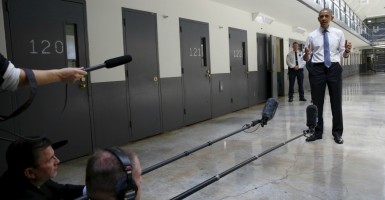HBO and Vice released a documentary about criminal justice problems that largely ignores existing reform initiatives. It features commentary by former Attorney General Eric Holder and has scenes of President Obama discussing criminal justice issues with a group of inmates in a federal prison.
It is regrettable that they do not meaningfully discuss existing criminal justice reforms.
The film presents some systemic problems with the criminal justice system and correctly says that a lot of work must be done to stymie overcriminalization, but it suggests, incorrectly, that work has not already begun.
Attracting new audiences to this issue is a vital first step in the process, and that seems to be the point of the film. But politicking and wheel-spinning over the problems are not the same as “fixing” them.
Many criminal law issues are reducible to the basic elements of a criminal law, including criminal intent (also called mens rea), and methods of statutory interpretation. Some problems can and should be addressed through reforms based on these aspects of criminal law.
Heritage scholars have written widely on these topics. To begin, there are simply too many federal criminal laws. Legislators should reduce that number and scrutinize all proposed criminal laws and regulations based on a set of simple principles. Before enacting any criminal legislation, lawmakers should seriously address four considerations.
First, an act must be so morally blameworthy that it deserves the law’s most serious condemnation.
Second, any new law must have an appropriate constitutional basis and should not simply duplicate existing crimes, and the benefits of criminalizing the conduct at issue should outweigh the significant costs of investigation, prosecution, and punishment.
Third, a new law must have a criminal-intent requirement that adequately protects the innocent and ensures that criminal punishment is imposed only for conduct the accused person knew was unlawful or wrongful.
Finally, lawmakers should consider what level of punishment serves the ends of justice: incarceration, probation, fines, restitution, and/or community service, keeping in mind the deprivation of constitutional rights and potential to permanently hamper a defendant’s ability to obtain employment, occupational licenses, and housing.
Mens rea reform is an urgent measure that would reduce the number of dubious criminal prosecutions and would make the system more fair and just. That is most true where the crime is malum prohibitum—or “wrong because prohibited” (i.e., a crime only because the legislature or a bureaucrat has said it is, not because it is inherently morally blameworthy)—which increases the likelihood that many individuals may be unaware of the existence of the crime and that their conduct may subject them to criminal liability. That is also the reason why we need a mistake of law defense to protect unwitting offenders.
There are other reforms that target the interpretation of statutes that ought to be implemented, such as codifying the Rule of Lenity to ensure that judges interpret criminal statutes in defendants’ favor if the judge finds the text ambiguous. And there are sentencing reforms that could leverage progress in these substantive areas of law.
These are but a few ideas proposed to counteract the issues identified in “Fixing the System.” It is time to attract a broader audience to the solutions.

























